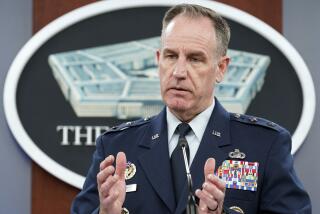U.S. Unequipped to Verify Some Cuts in Missiles, Report Warns
- Share via
WASHINGTON — The United States’ surveillance capabilities cannot assure Soviet compliance in some arms control issues now under consideration, a House committee charged Friday, calling into question verification efforts that have been a centerpiece of the Reagan Administration’s arms control policies.
The House Intelligence Committee, releasing the results of a three-year study, said that gaps in U.S. surveillance include ability to monitor the large inventories of undeployed missiles that would be covered by the intermediate-range missile treaty expected to be signed by President Reagan at his Dec. 7-10 meeting in Washington with Soviet leader Mikhail S. Gorbachev.
“U.S. monitoring assets have been unable to provide high-confidence answers to some questions of great importance to arms control,” the report said.
Faulting the Administration as having neglected to consult with the intelligence community on arms control agreements, the committee called on the Administration to be more mindful of the limits of U.S. technology and to insist, in some cases, on intrusive verification procedures before it approves an intermediate-range missile agreement or other arms accord.
Provisions for inspecting missile sites and other verification measures are still being negotiated in talks with the Soviets on the intermediate-range treaty.
Reagan Administration officials had no immediate comment on the House panel’s report. However, they have stressed repeatedly that thorough verification is among the Administration’s chief priorities in drafting a treaty.
The committee report was prepared at the request of committee member Dave McCurdy (D-Okla.), who presided over hearings on the issue.
Minority More Skeptical
A minority report released by conservative Republicans on the panel was even more skeptical about the United States’ abilities to ensure compliance with any arms accord with the Soviets. The six Republicans contended that the Soviets’ history of cheating on arms treaties was so extensive that any pact they would agree to would be inherently unverifiable.
The majority report said that the United States can retain “strong confidence” in its surveillance ability to monitor many aspects of arms control proposals, including Soviet long-range missiles deployed in fixed sites and on mobile launchers, as well as on submarines and bombers.
The areas where it falls short, it said, include proposals covering chemical weapons, nuclear testing and conventional forces.
More to Read
Sign up for Essential California
The most important California stories and recommendations in your inbox every morning.
You may occasionally receive promotional content from the Los Angeles Times.














